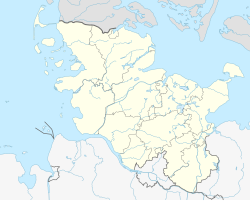
Back Kiel, Duitsland Afrikaans Kiel ALS ኪል Amharic Kiel AN كيل Arabic ܩܝܠ ARC Kiel AST Kiel Aymara Kil Azerbaijani کیل AZB
This article needs additional citations for verification. (May 2020) |
Kiel | |
|---|---|
|
Top to bottom, left to right: aerial view including Kiel Fjord and harbor, city hall on Rathausplatz, Maritime Museum, Laboe Naval Memorial and submarine U-995, City Hall Tower and Opera House as seen from the Kleine Kiel | |
| Coordinates: 54°19′24″N 10°08′22″E / 54.32333°N 10.13944°E | |
| Country | Germany |
| State | Schleswig-Holstein |
| District | Urban district |
| Subdivisions | 18 districts |
| Government | |
| • Lord mayor | Ulf Kämpfer[1] |
| • Governing parties | SPD / Greens / South Schleswig Voter Federation |
| Area | |
| • City | 118.6 km2 (45.8 sq mi) |
| Elevation | 5 m (16 ft) |
| Population (2022-12-31)[3] | |
| • City | 247,717 |
| • Density | 2,100/km2 (5,400/sq mi) |
| • Metro | 643,594[2] |
| Time zone | UTC+01:00 (CET) |
| • Summer (DST) | UTC+02:00 (CEST) |
| Postal codes | 24103–24159 |
| Dialling codes | 0431 |
| Vehicle registration | KI |
| Website | www.kiel.de |
Kiel (German: [kiːl] ⓘ) is the capital and most populous city in the northern German state of Schleswig-Holstein, with a population of 246,243 (2021).
Kiel lies approximately 90 kilometres (56 mi) north of Hamburg, and about the same distance south of the Danish border. Due to its geographic location in the southeast of the Jutland peninsula on the southwestern shore of the Baltic Sea, Kiel has become one of Germany's major maritime centres, known for a variety of international sailing events, including the annual Kiel Week, which is the biggest sailing event in the world. Kiel is also known for the Kiel Mutiny, when sailors refused orders to prepare to engage the British Navy in the last weeks of World War I, sparking the German Revolution which led to the abdication of the Kaiser and the formation of the Weimar Republic. The Olympic sailing competitions of the 1936 and the 1972 Summer Olympics were held in the Bay of Kiel.[4]
Kiel has also been one of the traditional homes of the German Navy's Baltic fleet, and continues to be a major high-tech shipbuilding centre. Located in Kiel is the GEOMAR – Helmholtz Centre for Ocean Research Kiel at the University of Kiel. Kiel is an important sea transport hub, thanks to its location on the Kiel Fjord (Kieler Förde) and the busiest artificial waterway in the world,[5] Kiel Canal (Nord-Ostsee-Kanal). A number of passenger ferries to Sweden, Norway, Lithuania and other countries operate from here. Moreover, today Port of Kiel is a popular destination for cruise ships touring the Baltic Sea.
Kiel's recorded history began in the 13th century. Before then, in the eighth century, it was a Danish village. Until 1864 it was administered by Denmark in personal union. In 1866 the city was annexed by Prussia and in 1871 it became part of Germany.
Kiel was one of the founding cities of the original European Green Capital Award in 2006.[6] In 2005 Kiel's GDP per capita was €35,618, which is well above Germany's national average, and 159% of the European Union's average.[7]
- ^ Landeshauptstadt Kiel. "Kiels Oberbürgermeister". Archived from the original on 2015-02-20.
- ^ "Growth – KielRegion – Association for Business Development Kiel / Germany". Archived from the original on 2015-11-29.
- ^ "Bevölkerung der Gemeinden in Schleswig-Holstein 4. Quartal 2022" (XLS) (in German). Statistisches Amt für Hamburg und Schleswig-Holstein.
- ^ "General Information". Kieler Woche. Archived from the original on 2005-12-30. Retrieved 2006-03-13.
- ^ Kusch, Regina. "Eröffnung des Nord-Ostsee-Kanals Die meistbefahrene künstliche Wasserstraße der Welt". Deutschlandfunk. Retrieved 28 January 2021.
- ^ "European Green Capitals". European Commission. Retrieved 16 May 2015.
- ^ "GDP per person 2005 in Euro". Archived from the original on December 27, 2008.
© MMXXIII Rich X Search. We shall prevail. All rights reserved. Rich X Search









